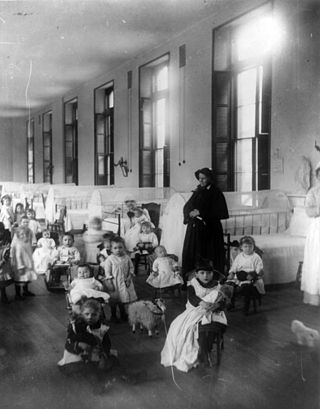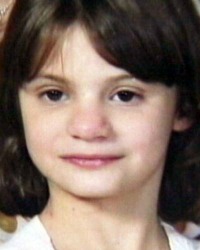
Adoption is a process whereby a person assumes the parenting of another, usually a child, from that person's biological or legal parent or parents. Legal adoptions permanently transfer all rights and responsibilities, along with filiation, from the biological parents to the adoptive parents.
The international adoption of South Korean children started around 1953 as a measure to take care of the large number of mixed children that became orphaned during and after the Korean War. It quickly evolved to include orphaned Korean children. Religious organizations in the United States, Australia, and many Western European nations slowly developed the apparatus that sustained international adoption as a socially integrated system.
Holt International Children's Services (HICS) is a faith-based humanitarian organization and adoption agency based in Eugene, Oregon, United States, known for international adoption and child welfare. The nonprofit works in thirteen countries, including: Cambodia, China, Colombia, Ethiopia, Haiti, India, Mongolia, Philippines, South Korea, Thailand, Uganda, Vietnam, and the United States. This work includes a range of services for children and families including efforts in nutrition, education, family strengthening, orphan care, foster care, family reunification, and child sponsorship. The organization's stated mission is to seek a world where every child has a loving and secure home.
International adoption is a type of adoption in which an individual or couple residing in one country becomes the legal and permanent parent(s) of a child who is a national of another country. In general, prospective adoptive parents must meet the legal adoption requirements of their country of residence and those of the country whose nationality the child holds.
Closed adoption is a process by which an infant is adopted by another family, and the record of the biological parent(s) is kept sealed. Often, the biological father is not recorded—even on the original birth certificate. An adoption of an older child who already knows their biological parent(s) cannot be made closed or secret. This used to be the most traditional and popular type of adoption, peaking in the decades of the post-World War II Baby Scoop Era. It still exists today, but it exists alongside the practice of open adoption. The sealed records effectively prevent the adoptee and the biological parents from finding, or even knowing anything about each other. However, the emergence of non-profit organizations and private companies to assist individuals with their sealed records has been effective in helping people who want to connect with biological relatives to do so.

Joel Barnet Steinberg is a disbarred New York City criminal defense attorney who attracted international media attention when he was accused of rape and murder, and was convicted of manslaughter, in the November 1, 1987, beating and subsequent death of a six-year-old girl, Elizabeth ("Lisa") Launders, whom he and his live-in partner, Hedda Nussbaum, had illegally adopted.
Disruption is ending an adoption. While technically an adoption is disrupted only when it is abandoned by the adopting parent or parents before it is legally completed, in practice the term is used for all adoptions that are ended. It is usually initiated by the parents via a court petition, much like a divorce, to which it is analogous.
Interracial adoption refers to the act of placing a child of one racial or ethnic group with adoptive parents of another racial or ethnic group.
Genealogical bewilderment is a term referring to potential identity problems that could be experienced by a child who was either fostered, adopted, or conceived via an assisted reproductive technology procedure such as surrogacy or gamete donation.
Child laundering is a tactic used in illegal or fraudulent international adoptions. It may involve child trafficking and child acquisition through payment, deceit or force. The children may then be held in sham orphanages while formal adoption processes are used to send them to adoptive parents in another country.
Ronnie Antonio Paris was an American three-year-old boy from Tampa, Florida, who was murdered in 2005. Paris was subject to severe physical abuse at the hands of his father, Ronnie Paris Sr., who was convinced he was homosexual despite his young age, and was forced to box repeatedly, eventually entering a coma and dying from brain injuries. His death brought attention to the Florida Department of Children & Families for failing to identify the child abuse and neglect. Controversy arose over Paris being removed from his home and placed in to foster care, only to be returned, and died within six weeks from continued abuse. Ronnie Paris Sr. was convicted of manslaughter and sentenced to 30-years in prison.
Adoption in France is codified in the French Civil Code in two distinct forms: simple adoption and plenary adoption.

Nubia Docter Barahona was a 10-year-old American girl who was abused and murdered on February 11, 2011. Her body was found February 14, 2011, wrapped in a plastic garbage bag in the bed of her adoptive father's pickup truck on the side of I-95 in West Palm Beach, Florida. Her body had partially decomposed from being covered in chemicals, possibly pesticides.
Ngatikaura Ngati was a New Zealand toddler of Tongan descent who died of child abuse in January 2006. After the conclusion of the trial of Ngati's killers, a judge ordered the release of the coroner's autopsy photographs of the child, for the purpose of encouraging the public to report other instances of abuse. TVNZ 1 broadcast the images, and they subsequently appeared on the Internet, sparking a debate about the balance between promoting awareness of child abuse, and maintaining dignity and respect for the deceased child.
Hana Grace-Rose Williams was a girl adopted from Ethiopia by an American couple living in Sedro-Woolley, Washington. She died in 2011 of hypothermia, according to an autopsy, and her adoptive parents Carri and Larry Williams were convicted in September 2013. The adoptive father was later convicted of manslaughter in her death. Carri Williams was convicted of "homicide by abuse" for Williams' abuse and death and was convicted of "first-degree assault of a child" for abusing a second adopted Ethiopian child who survived and testified at her trial.

Adoption in the Philippines is a process of granting social, emotional and legal family and kinship membership to an individual from the Philippines, usually a child. It involves a transfer of parental rights and obligations and provides family membership. The Department of Social Welfare and Development (DSWD) defines adoption as a "socio-legal process of giving a permanent family to a child whose parents have voluntarily or involuntarily given up their parental rights."

Erica Lynn Parsons was a 13-year-old girl from Salisbury, North Carolina, who disappeared mysteriously in 2011.
Adoption studies typically compare pairs of persons, e.g., adopted child and adoptive mother or adopted child and biological mother, to assess genetic and environmental influences on behavior. These studies are one of the classic research methods of behavioral genetics. The method is used alongside twin studies to identify the roles of genetics and environmental variables that impact intelligence, and behavioral disorders.
There have been several high-profile cases of deportation of Korean adoptees from the United States. Prior to the passage of the Child Citizenship Act of 2000, the adoptive parents of adoptees had to file for their child to naturalize before the age of 16. Many parents were unaware of this requirement, assuming that their adopted children automatically derived citizenship from them, and therefore did not apply. The Child Citizenship Act sought to remedy this issue by extending citizenship to all international adoptees who were under 18 at the time that the bill was passed, but did not apply retroactively. This left those adopted by American families prior to 1983 vulnerable to deportations.
Jeong-In was a 16-month-old baby girl from Seoul, South Korea, who was abused and tortured by her adoptive parents for 271 days, and ultimately died on October 13, 2020, due to severe abdominal injuries. Her adoptive full name was Ahn Yul-Ha (안율하).



